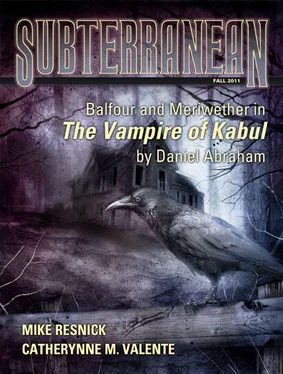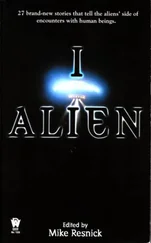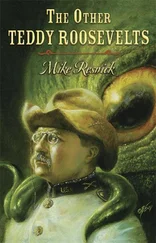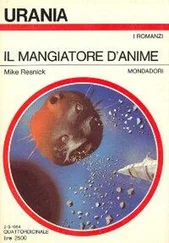Mike Resnick - Shaka II
Здесь есть возможность читать онлайн «Mike Resnick - Shaka II» весь текст электронной книги совершенно бесплатно (целиком полную версию без сокращений). В некоторых случаях можно слушать аудио, скачать через торрент в формате fb2 и присутствует краткое содержание. Год выпуска: 2011, Издательство: Subterranean Press, Жанр: Фантастика и фэнтези, на английском языке. Описание произведения, (предисловие) а так же отзывы посетителей доступны на портале библиотеки ЛибКат.
- Название:Shaka II
- Автор:
- Издательство:Subterranean Press
- Жанр:
- Год:2011
- ISBN:нет данных
- Рейтинг книги:3 / 5. Голосов: 1
-
Избранное:Добавить в избранное
- Отзывы:
-
Ваша оценка:
- 60
- 1
- 2
- 3
- 4
- 5
Shaka II: краткое содержание, описание и аннотация
Предлагаем к чтению аннотацию, описание, краткое содержание или предисловие (зависит от того, что написал сам автор книги «Shaka II»). Если вы не нашли необходимую информацию о книге — напишите в комментариях, мы постараемся отыскать её.
Shaka II — читать онлайн бесплатно полную книгу (весь текст) целиком
Ниже представлен текст книги, разбитый по страницам. Система сохранения места последней прочитанной страницы, позволяет с удобством читать онлайн бесплатно книгу «Shaka II», без необходимости каждый раз заново искать на чём Вы остановились. Поставьте закладку, и сможете в любой момент перейти на страницу, на которой закончили чтение.
Интервал:
Закладка:
“This one,” he said, “was for attacking the enemy’s flagship while in a small shuttlecraft.” He snorted contemptuously. “As if I had a choice. The shuttle was three thousand miles away from the mother ship when the enemy suddenly appeared between us.”
“And the other two?”
He shrugged. “I’ve no idea. You would have to ask the man I took them from.”
“You stole them?” I asked.
“Only after he attacked me in a drunken rage and I killed him. If he was brave enough to win them, and I was brave enough to defend myself and take them away from him, then I won them by proxy.” A quick smile. “And I will make sure no one asks me about their origin during the campaign.”
“You have only one month before the election,” I noted. “Perhaps it will not come up.” Then: “When will you go to Ulundi to begin campaigning?”
“As soon as you take me there,” he replied.
“I can’t,” I said. “I told you—I have a job and responsibilities.”
“Forget them,” he said. “You are working for me now.”
“I am?” I said with a smile. “When is payday?”
“Soon,” he said with no show of embarrassment.
“Soon,” I repeated sardonically.
“And often.”
I knew I should refuse, that I should put him on public transport to Ulundi the next morning and show up at my job, as boring and poorly paid as it was, but I must confess that I was curious to watch him campaign—he always had such control of his emotions that I wanted to see how he whipped a crowd into a frenzy while remaining cool and collected himself. Then, too, if he was successful, if he actually gained a modicum of political power, there was the possibility that I could do more good for more people than just teaching one impoverished group of children. I would miss them, and I hoped they would miss me, but if things worked out, maybe I could help them more in Ulundi than in the classroom.
I called in sick, we arrived in Ulundi the next afternoon, Robert registered his party and announced his candidacy, and then we took a room in a hotel that was one step above being a flophouse.
The next morning Hector ole Kunene failed to show up at a small breakfast for the party faithful. He didn’t appear for a noon interview and an afternoon rally, and in fact was never seen again.
And twenty-seven days later Robert ole Buthelezi, representing the Zulu Party, won an uncontested election for the office of Clerk of Records.
It didn’t seem like much at the time, but years later historians would want all the details, however insignificant.
4.
When Robert took office, he gave me an imposing title—Vice Chairman and Confidential Advisor—but I was just a glorified filing clerk. I suppose I should have quit after the first week and gone back home, but my paycheck after that week was more than I made in a month as a teacher. I couldn’t figure it out—I was clearly a flunky, nothing more—but somehow when Robert put through the voucher for my salary no one argued with him. Which was probably just as well; Robert did not lose very many arguments. I sent half of my check to the school, and decided to stay.
Ulundi wasn’t Johannesburg or Pretoria, but it was still far more sophisticated than the town where I had been living. A monorail circled the city, two matching skyscrapers reached for the clouds, and the city’s power was now supplied by nuclear energy.
Each evening I stopped by a local restaurant on my way back to my rented room. From time to time Robert would choose to eat there, but never alone. Invariably he was in the company of men I did not know. Some were very well-dressed, and often had their government ID tags still affixed to their tunics. Others were poorly-dressed, and made no attempt to hide the fact that they carried weapons. It made no difference to Robert; he was equally at home with all of them.
Well, perhaps I should reword that: he was equally comfortable and self-contained with either group. I don’t know for a fact that I ever saw him actually enjoy another man’s company. I know that he enjoyed the company of women, but not in that way and not in public.
We had been in Ulundi for about four months when he finally invited me out to dinner. It was the first meal we had eaten together since we had arrived in the city. He took me to a posh restaurant, where all the staff seemed to know him (as did many of the diners), and we were escorted to a table in the farthest corner of the room.
“This is my regular table here,” he said as we sat down. “I do not believe any other diners can overhear me here as long as I keep my voice down.”
“I would think they have very little interest in governmental record-keeping anyway,” I said.
He laughed, the first laugh I had heard him utter since he returned after his ten-year absence.
“If there was any doubt that we are brothers, that eradicates it,” he said. “Our father had a sense of humor too—or so I have been told.” Neither of us remembered much of Buthelezi, who had wandered off one day and never returned. In truth, we had no idea if he was still alive.
“I am sure it will be a very fine meal,” I said, “and I will speak so softly no one can possibly overhear me, but I still don’t know why I am here.”
“To make plans, of course.”
“Just me?” I asked. I stared at him curiously. “Am I being fired?”
“No, and no,” he said. “But if we are to move to Pretoria in a few months, we must prepare.”
“Are we moving to Pretoria?”
He nodded his head. “I told you we would not be in Ulundi for long.”
“You have found a better job?” I asked.
“I have served my apprenticeship,” he answered. “It is time to become President.”
“Based on three medals, two of which aren’t yours, and four months as Clerk of Records in a backwater province?” I said.
“It is a backwater province,” he replied. “It is time to leave it.”
“I have no problem with that,” I said. “But to think you can become the President of all South Africa…”
“It is the logical next step in the progression.”
“The progression?” I said, surprised. “You mean there’s more?”
He looked at me rather sadly, the way you might look at a pet that will never understand what you are trying to teach it.
“There is more.”
“The Presidency of South Africa”—an impossibility in itself—“isn’t enough?”
“When Tchaka became king of the Zulus, Zululand was perhaps ten square miles,” he shot back. “Was that enough?”
“He controlled only ten square miles; the President controls hundreds of thousands,” I said. “There’s a difference.”
“Only in degree,” replied Robert. “His world covered the southern tip of Africa. Mine extends as far as the eye can see.”
“So did his,” I argued.
Robert gave me another sad smile reserved for pets of limited intelligence. “He never looked up.”
5.
Lloyds of London had the odds against him at 200-to-1 with eleven weeks to go. The one casino in Las Vegas that booked bets on it lowered it to 175-to-1 in case there was a sympathy vote for the poor clerk who had the temerity to buck the entrenched political machine. Robert borrowed a thousand rands and bet on himself.
Two months before the election there was a debate between the three leading candidates. Well, actually, the two leading candidates and Robert. It was held in a stadium in Cape Town, rather than a holo studio, and some forty thousand people were in attendance. It was a bright, sunlit day, as almost all days on the Cape are, and it was estimated that more than eighty million people, in South Africa and elsewhere, were watching on their Tri D’s and their computers’ holoscreens.
Читать дальшеИнтервал:
Закладка:
Похожие книги на «Shaka II»
Представляем Вашему вниманию похожие книги на «Shaka II» списком для выбора. Мы отобрали схожую по названию и смыслу литературу в надежде предоставить читателям больше вариантов отыскать новые, интересные, ещё непрочитанные произведения.
Обсуждение, отзывы о книге «Shaka II» и просто собственные мнения читателей. Оставьте ваши комментарии, напишите, что Вы думаете о произведении, его смысле или главных героях. Укажите что конкретно понравилось, а что нет, и почему Вы так считаете.












